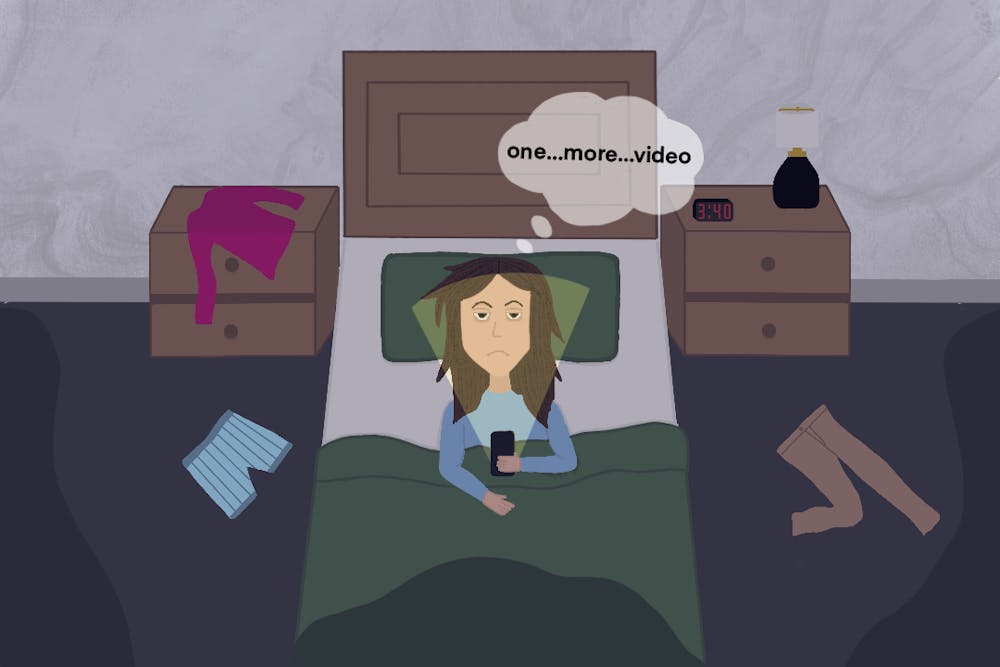When you get home after a long day of classes, meetings and homework to a rare, glorious window of free time, what is the first thing you do?
Do you lay on the floor and immediately go on your phone? That's okay, it's what most people do.
You find yourself on X or TikTok, and before you know it, three hours have gone by and you've watched way too many videos making fun of the presidential debate.
A substantive population of college students tends to find themselves in this exact position, and no one really knows why.
"It can be just an escape, and it doesn't have to always be unhealthy," said Marcella Gemelli, a sociology professor at ASU. "It allows your brain a break."
These mental respites can leave users feeling guilty, emotionally exhausted and anxious for the future of the world. This culmination is known as doomscrolling, a term for when you can't stop consuming content that makes you overwhelmed or upset.
Often, young people develop this tendency out of a fear of missing out, or out of an attempt to be aware of what is happening in the world.
Unfortunately, there is no way of stopping unless you force yourself to — the algorithm will feed you what you seek more of.
"If you keep looking at feeds that are distressing, or depressing, or that could even have harmful content, the algorithm could pick up on that, and it's going to start feeding you more," Gemelli said.
"It's going to place a big responsibility on you to try to counteract that."
Students usually face the worst of this because they are often working jobs, taking classes and trying to have a social life.
"Since you're just (online) for endless hours, it makes you fall behind on any homework, any work you have to do," Maria Urquidy, a sophomore studying kinesiology, said. "It doesn't help you learn how to manage your time properly. Even though everyone says, 'Oh, I want to learn how to manage my time,' we all just go doomscrolling for hours."
On the other hand, some students prefer not to go on their phones at all, and stay rooted in the outside world.
"I hate being on my phone, I don't even enjoy TV," Reanna Schrader, a freshman studying nursing, said. She added that, for her, it's hard to stop once she starts because there's an overload of content at her fingertips.
Schrader also said that using her phone less means she constantly has the urge to be productive and does not get the mental break from work that people get from being on their phones: But is this break good or bad?
"Our attention is diverted away from what's really important," Gemelli said. "Instead of thinking about creative answers to social problems, for example, we're diverted with all this fancy, meaningless content that diverts us from some of the bigger, important things."
READ MORE: Insight: College introduced me to Advice-Tok
Developing this habit seems to have several downsides, but many users can't seem to stop themselves. The key, according to Gemelli, is balance.
"You can say to yourself, 'I need a brain break. I'm just going to scroll through Instagram posts or look at my favorite celebrity, see what they're up to,'" Gemelli said, noting that giving yourself a hard time limit to escape into the algorithm before getting back to being productive is a potential solution.
Specific solutions work for some people, but all consumers can do to escape the ever-present tornado of constant information is to be more aware.
"We're in a place now where there's social media everywhere," Gemelli said. "There's news everywhere. With the increase of generative AI tools, it's becoming more important that we just become wise consumers of information."
Edited by Andrew Dirst, Abigail Beck and Natalia Jarrett.
Reach the reporter at ktale@asu.edu and follow @KasturiTale on X.
Like The State Press on Facebook and follow @statepress on X.
Kasturi is a sophomore studying journalism. This is her third semester with The State Press. She has her own blog and has worked in creative writing.




